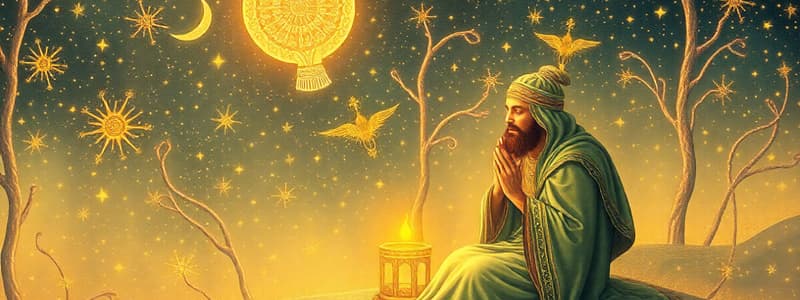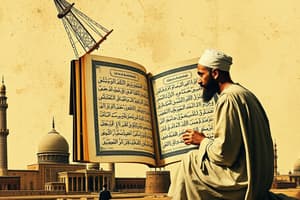Podcast
Questions and Answers
What role did the Quran play in the lives of Muslims during the expansion of Islam?
What role did the Quran play in the lives of Muslims during the expansion of Islam?
- It focused on the economic models of the Islamic community.
- It outlined military strategies for conquests.
- It provided historical accounts of earlier prophets.
- It served as a guide on how Muslims should live their lives. (correct)
Which of the following statements accurately reflects the impact of the Treaty of Hudaybiyah?
Which of the following statements accurately reflects the impact of the Treaty of Hudaybiyah?
- It marked the end of all military conflicts for Islam.
- It strengthened the unity of various Arab tribes under Islam. (correct)
- It was an agreement that solely benefited non-Muslims.
- It halted the expansion of Islam significantly.
What was one major consequence of the expansion of Islam during Prophet Muhammad's leadership?
What was one major consequence of the expansion of Islam during Prophet Muhammad's leadership?
- The establishment of Islam as a minor sect.
- The decline of cultural and scientific advancement in the Arab world.
- The growth of the Muslim empire boosted the credibility of Prophet Muhammad's claims. (correct)
- Increased conflict with other major religions without resolution.
What are the five pillars of Islam that Prophet Muhammad left behind?
What are the five pillars of Islam that Prophet Muhammad left behind?
How did Prophet Muhammad's teachings influence future generations?
How did Prophet Muhammad's teachings influence future generations?
What event marks the beginning of the Islamic calendar?
What event marks the beginning of the Islamic calendar?
Who provided initial protection to Prophet Muhammad during his early years of preaching?
Who provided initial protection to Prophet Muhammad during his early years of preaching?
What does the first revelation to Prophet Muhammad emphasize?
What does the first revelation to Prophet Muhammad emphasize?
What was the primary purpose of the Treaty of Hudaybiyah?
What was the primary purpose of the Treaty of Hudaybiyah?
What challenge did Prophet Muhammad face from the Quraysh tribe?
What challenge did Prophet Muhammad face from the Quraysh tribe?
What impact did the Night of Power (Lailat al-Qadr) have on the revelations received by Muhammad?
What impact did the Night of Power (Lailat al-Qadr) have on the revelations received by Muhammad?
What role did Prophet Muhammad's meeting with the delegates from Medina have in the spread of Islam?
What role did Prophet Muhammad's meeting with the delegates from Medina have in the spread of Islam?
What was a key characteristic of Prophet Muhammad's approach during conflicts?
What was a key characteristic of Prophet Muhammad's approach during conflicts?
Flashcards
Treaty of Hudaybiyah
Treaty of Hudaybiyah
A key event that marked a turning point in the spread of Islam by demonstrating Prophet Muhammad's strategic brilliance and the power of diplomacy.
Prophet Muhammad's message
Prophet Muhammad's message
A key strategy used by Prophet Muhammad that allowed him to unite various Arab tribes and expand the influence of Islam.
Sunnah
Sunnah
The compilation of Prophet Muhammad's teachings and practices that provide guidance for Muslims beyond the Quran.
Five Pillars of Islam
Five Pillars of Islam
Signup and view all the flashcards
Expansion of the Muslim Empire
Expansion of the Muslim Empire
Signup and view all the flashcards
Lailat al-Qadr (The Night of Power)
Lailat al-Qadr (The Night of Power)
Signup and view all the flashcards
The Quran
The Quran
Signup and view all the flashcards
Angel Gabriel
Angel Gabriel
Signup and view all the flashcards
The Year of Sorrow
The Year of Sorrow
Signup and view all the flashcards
The Hijra
The Hijra
Signup and view all the flashcards
Quraysh tribe
Quraysh tribe
Signup and view all the flashcards
People of Medina
People of Medina
Signup and view all the flashcards
Study Notes
Prophet Muhammad and The Origins of Islam
- Islam is not a new religion; it existed from the beginning of humanity, with Prophet Muhammad being the final messenger tasked with delivering its message.
- Prophet Muhammad's revelations began in 610 CE when he received his first revelation in the cave Hira, near Mecca, marking the beginning of Islam.
- The Glorious Quran, Islam's holy book, was revealed to Prophet Muhammad in parts over 23 years.
- The first revelation, known as Lailat al-Qadr (the Night of Power), occurred on one of the odd nights of the last 10 nights of Ramadan.
- The angel Gabriel commanded Prophet Muhammad to read, but the Prophet was illiterate. The angel pressed him thrice and finally proclaimed, “Read in the name of your Lord who created. Created man from a clinging clot. Read! And your Lord is the Most Generous, who taught by the pen.”
- Prophet Muhammad encountered resistance from many in Mecca who saw Islam as a threat to their polytheistic beliefs and economic interests.
- Prophet Muhammad's wife Khadijah and uncle Abu Talib provided him with initial protection, but both passed away in 619 CE, known as the "Year of Sorrow," leaving him vulnerable to persecution.
- The Quraysh tribe, dominant in Mecca at the time, sought to assassinate Prophet Muhammad.
The Hijra (Migration)
- In 620 CE, Prophet Muhammad met with delegates from Medina and presented them with Islam, which they accepted and pledged to spread.
- The people of Medina sought to unite their warring tribes under Islam.
- In 622 CE, a group of Muslims travelled from Medina to Mecca to pledge allegiance to Prophet Muhammad.
- The Quraysh plot to assassinate Prophet Muhammad, fearing the growing influence of Islam.
- Prophet Muhammad received divine permission to migrate from Mecca to Medina, this event is known as the Hijra, marking the beginning of the Islamic calendar.
The Treaty of Hudaybiyah
- The Treaty of Hudaybiyah was signed in 628 CE between Prophet Muhammad and the Meccans.
- It allowed Muslims to perform the pilgrimage to Mecca, signifying a major symbolic victory for the Muslims.
- The treaty marked a turning point in the conflict between the Muslims and the Quraysh, offering a path to a peaceful resolution.
- It demonstrated Prophet Muhammad's skill as a negotiator, demonstrating his commitment to peaceful conflict resolution.
The Impact of the Treaty of Hudaybiyah and Expansion of Islam
- Prophet Muhammad's message resonated with many Arab tribes, uniting them under Islam and fostering cooperation.
- Islam expanded under Prophet Muhammad's leadership through a series of military victories.
- The growth of the Muslim empire gave credibility to Prophet Muhammad's prophetic claims, leading to Islam's establishment as a major world religion.
- The Quran, Islam’s holy book, served as a guide for how Muslims should live their lives.
- The Sunnah, a compilation of Prophet Muhammad's teachings and practices, provides further guidance for Muslims.
- Islam's growth led to a thriving society built on a foundation of interfaith tolerance, resulting in the flourishing of culture, science, and art.
Prophet Muhammad's Legacy
- Prophet Muhammad passed away in 632 CE, leaving behind the five pillars of Islam: the Testimony of Faith, Prayer, Obligatory Charity, Fasting and the Pilgrimage to Mecca.
- His teachings continue to shape the lives of billions of people around the world, highlighting the continuing relevance of his message.
Studying That Suits You
Use AI to generate personalized quizzes and flashcards to suit your learning preferences.




